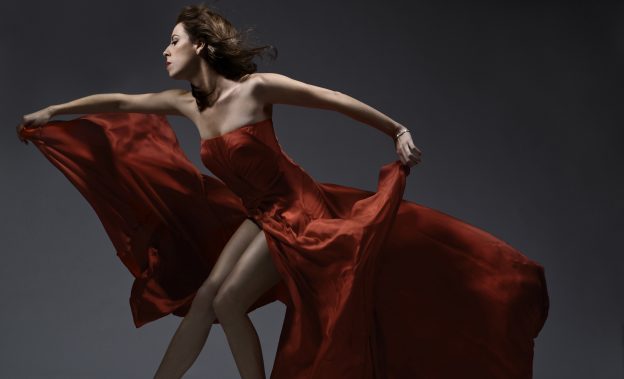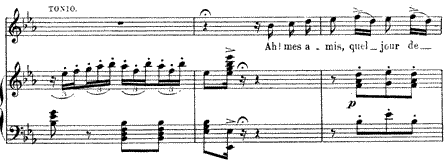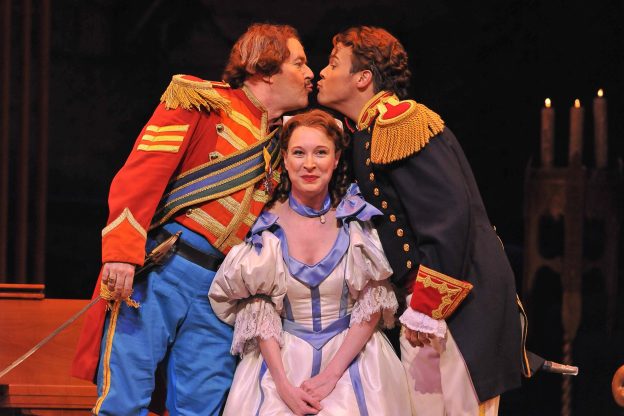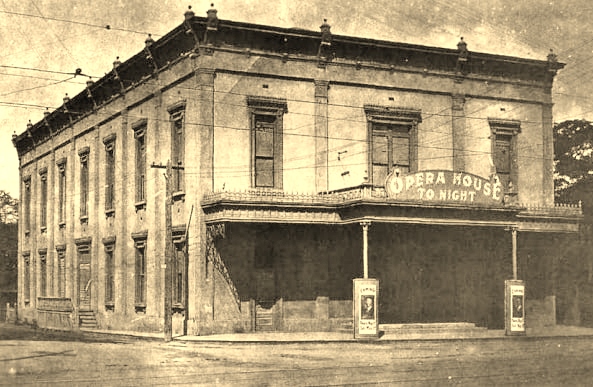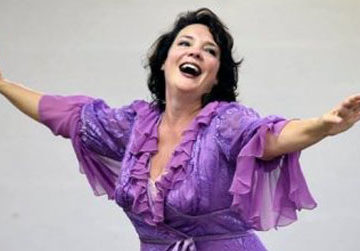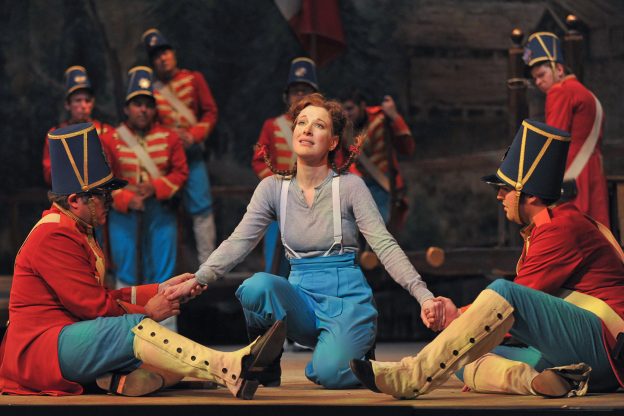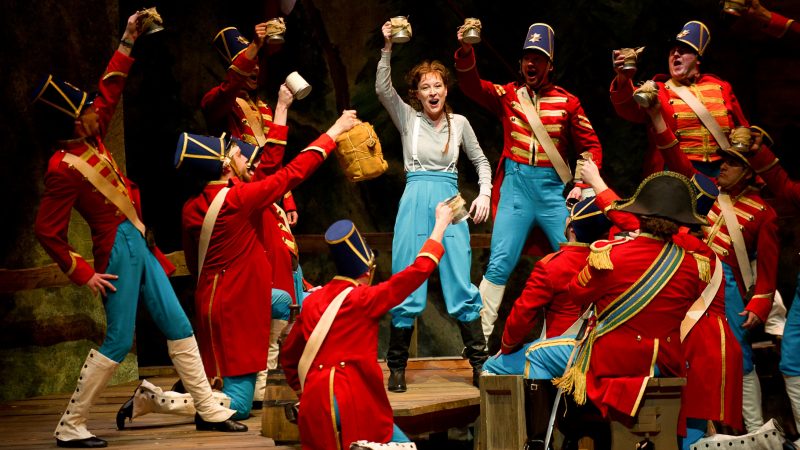If you are a musical theatre lover, try following up your visit to HOT this weekend for Puccini’s La Bohème by watching Johathan Larson’s musical “Rent.”
Larson, like so many others, was captivated by La Bohème. He saw himself and his roommates in the opera’s characters. After watching La Bohème, he intensely studied its music and narrative.
“I analyzed the libretto, broke it down beat by beat,” Larson told the New York Times.
He then took the characters from La Bohème and imagined them in present-day New York. They faced the same financial difficulties, but the disease that plagued their friend group was AIDS instead of Tuberculosis.
Here’s a brief comparison between Puccini’s Parisian roles and their New Yorker counterparts:
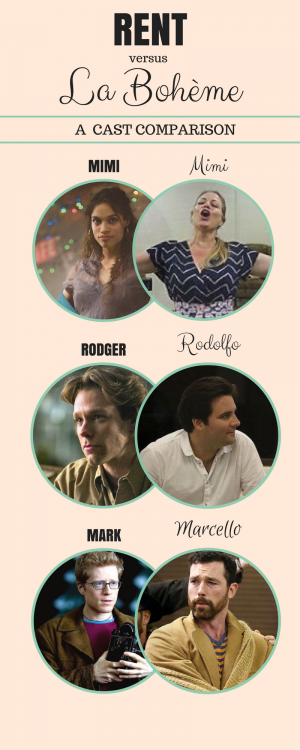
La Bohème’s Mimi vs. Rent’s Mimi
Audiences are introduced to Mimi in both the opera and the musical as the sweet and seductive “girl next door” whose candle has gone out.
In La Bohème, Mimi – a seamstress – asks her neighbor Rodolfo for matches to light her candle. The two flirt and fall in love during arias like Che gelida manina – “What a cold little hand” and Sì, mi chiamano Mimì – “Yes, they call me Mimì.” The audience learns during the opera that Mimi is plagued by tuberculosis, which ultimately leads to her death.
In “Rent,” Mimi is a night club dancer addicted to heroin who asks her neighbor Rodger to light her candle after her heat is turned off next door. The two similarly flirt and fall in love throughout the duet “Light My Candle.” The song ends with Mimi declaring, “They call me Mimi.” Mimi, like many other characters in the musical, suffers from AIDS. After living on the streets and leaving rehab, the disease almost kills her. But unlike in La Bohème, Mimi appears to die, but suddenly awakens. She was heading to the light, but another character, who did lose their life to AIDS, told her to go back.
La Bohème’s Rodolfo vs. Rent’s Rodger
Although La Bohème’s Rodolfo is a poet, while Rodger in “Rent” is a songwriter and ex-junkie, they have quite a lot in common.
In both La Bohème and “Rent,” audiences are taken by the characters of Rodolfo and Rodger. Both experience joy and pain, and both are moved by their need for love. Rodolfo and Rodger are sentimental, thoughtful dreamers who are loved by their friends for their sense of humor. But after their friends leave them alone in the beginning of each production, we see that both characters are missing something in their lives. Rodolfo admits he is uninspired to write an article for a local newspaper, while Rodger mourns the loss of his last girlfriend to AIDS in the song “One Song Glory,” which speaks of his desire to write just one more song.
After each character falls for their respective Mimi after seeing her beauty in the moonlight, as Rodolfo sings in O soave fanciulla – “Oh lovely girl,” their worlds are turned upside down. Throughout the productions, audiences begin to see the characters’ fear of love as each pull away from Mimi. But both Rodolfo and Rodger fully embrace their feelings as she is on her deathbed.
La Bohème’s Marcello vs. Rent’s Mark
In La Bohème and in “Rent,” Marcello and Mark represent the incredibly loyal best friend who struggles with loving a promiscuous woman.
After leaving the cold apartment that he shares with Rodolfo, La Bohème’s Marcello – a painter – must endure his ex-lover, Musetta, singing about her many admirers. But what Marcello does not know is that the song is a ploy to win him back. Throughout the opera, we see that Marcello is a character others can trust. Mimi confides in him her frustration with Rodolfo’s jealousy during O buon Marcello, aiuto! – “Oh, good Marcello, help me!” and Rodolfo later confesses to Marcello that his jealousy is a cover-up for his worries about Mimi’s terrible cough, which he fears is Tuberculosis.
Mark’s ex-lover in “Rent” is Maureen. But unlike the characters of La Bohème, Mark bonds with Maureen’s new lover during the duet “Tango Maureen,” where both share their experiences of Maureen’s cheating. Mark is also trusted by many characters. We see this as the members of an AIDS support group open up to him and allow him to film them for a documentary he is making. The film later pays tribute to the characters of “Rent” who lost their lives to the disease.

La Bohème’s Schaunard vs. Rent’s Angel Dumott Schunard
In both the opera and the musical, one character is very fortunate in the beginning of the productions and becomes less fortunate as the story progresses.
La Bohème’s Schaunard, the musician of the group, arrives to the apartment with food, firewood, wine, cigars, and money. He explains that his temporary riches came from an eccentric, wealthy Englishman, who employed him to perform music to his dying parrot. But as the year passes, Schaunard’s riches diminish until the last act contrastingly shows him arriving to the apartment with a meager amount of food.
Angel Dumott Schunard is introduced to the “Rent” story similarly. The AIDS-positive drag queen drummer sings “Today 4 U,” during which the audience learns that she recently acquired a large sum of money after she was hired by a wealthy woman in a limousine to kill a neighbor’s “yappy dog.” During the song “Contact” in the second act, the audience learns that Angel has died of AIDS. While La Bohème ends tragically with the death of Mimi, the character of Mimi in “Rent” lives – thanks to Angel telling her in a hallucination to turn around and not go toward the warm, white light.
La Bohème’s Colline vs. Rent’s Collins
The character of Colline in La Bohème and of Collins in “Rent” both experience loss, but in very different ways.
Colline, a philosopher, enters the apartment cold and unhappy in the first act of La Bohème after he was unable to pawn some books, but his mood soon changes after Schaunard shares the money and gifts he has earned from the wealthy Englishman. While the group of friends still has the money, Colline buys himself a coat and Schaunard a horn. By the last act, after the money is all gone, Colline and Schaunard try to keep their spirits up by pretending their small meal is a feast and engaging in a mock duel. But as the dying Mimi enters, all sense of happiness disappears. Colline expresses his sadness about how much things have changed from the first act in the aria Vecchia Zimarra – “Old Coat,” as he says goodbye to coat he bought earlier in the year in order to try to afford medicine for Mimi.
The audience meets Collins of “Rent,” who is a philosophy professor, after he has been beaten and left for dead an in alley. Angel Dumott Schunard finds him there and dresses his wounds. The two fall in love and sing of how they will cover each other like a coat during the duet “I’ll cover you.” After Angel dies, Collins is beside himself. He sings a reprise of “I’ll cover you” at Angel’s funeral.
La Bohème’s Musetta vs. Rent’s Maureen
The role of an animated, promiscuous singer is represented by Musetta in La Bohème and by Maureen in “Rent.”
As the roommates of La Bohème enter Café Momus to celebrate Schaunard’s earnings, they encounter Marcello’s ex-lover Musetta, who is escorted by a rich new suitor. As she sings about how much she enjoys having many male admirers in Quando me’n vo’ – “When I go along,” Mimi sees that she actually still loves Marcello. Bored with her rich suitor, Musetta pretends that her shoe is too small and sends him off to buy her another. While he is gone, she reunites with Marcello and charges the full dinner bill to the rich suitor. As the opera progresses, the audience sees that Marcello and Musetta’s love is an imperfect one, and it is very different from Mimi and Rodolfo’s. This is obvious in the quartet that leads to Marcello and Musetta leaving each other again: Addio dolce svegliare alla mattina – “Goodbye, sweet awakening in the morning.” Nevertheless, as Mimi is dying, she reminds Marcello that Musetta is good.
In “Rent,” Maureen has found a new lover after leaving Mark. Mark and Maureen never get back together, although they flirt throughout the musical. Maureen also loudly disapproves of the roommates’ landlord changing his mind about whether or not they owe rent and protests this in her performance of “Over the Moon.” Though Maureen’s new lover faces the challenge of her infidelity several times, leading to their split in the song “Take Me or Leave Me,” they later reconcile. The audience learns that Maureen does value love, though she often doesn’t act like it.
By Allison Kronberg
